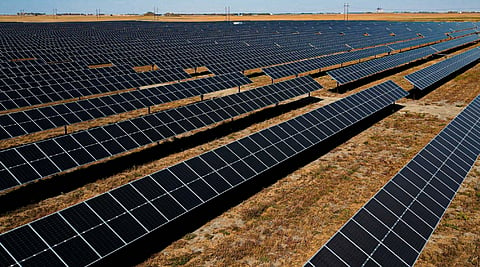

Alberta’s power regulator has been operating under “outdated ideological” assumptions when approving renewable energy projects — comments that come amid mounting rural opposition to the spread of solar and wind farms across the province.
That’s the word from Alberta Premier Danielle Smith, who on her weekly radio program on Saturday acknowledged growing frustrations with the Alberta Utilities Commission (AUC), suggesting its approach to ‘green’ energy approvals has not kept pace with evolving provincial priorities.
“When we came in, we started seeing that we had instability in our grid… so we’re in the process of changing the market,” Smith said. “We’re kind of in the middle of moving from one ideological perspective that wasn’t working to something a lot more pragmatic.”
Yet the premier stopped short of committing to specific regulatory changes, instead suggesting that current AUC decisions may still reflect the former NDP government’s push toward a 30% renewable grid target — a policy the UCP inherited but has been trying to rebalance in favor of reliability, affordability and “respect” for agricultural lands.
Smith’s comments follow months of growing discontent in rural communities where residents feel ignored by the very agencies tasked with evaluating the social and environmental impact of renewable energy projects.
Following a spontaneous, grassroots revolt in Caroline, similar battles are erupting in towns like Lacombe, Hanna, Provost and Youngstown, where international developers are proposing large-scale solar projects on productive farmland.
The conclusion of the UCP’s seven-month moratorium on renewables in February of last year was supposed to usher in new rules that would prioritize agriculture, ensure reclamation security and give municipalities a stronger voice. But residents say those promises have not materialized in practice.
“We’re seeing a wave of developer-friendly approvals that don’t reflect the new regulations or the public’s concerns,” said Russell Barnett, a landowner and spokesperson for the Rural Alberta Concerned Communities Group (RACCG), which is fighting a recently approved solar project near Caroline.
“It feels like the AUC is still operating under the old playbook.”
In the Caroline case, the AUC approved a 14.67-megawatt solar array on 57 acres zoned residential — just 21 metres from nearby homes — despite more than two years of organized community opposition.
“This isn’t about being anti-renewable,” said Barnett. “It’s about respecting land use laws, viewscapes, and the livelihoods of farming families. What we see instead is the AUC giving developers a second chance to fix flawed applications instead of holding them accountable.”
That sentiment was echoed on Smith’s call-in show by Mark Wight, a landowner and farmer from the Municipal District of Provost, who has been fighting a proposed solar installation that would occupy more than 300 hectares of privately-owned farmland.
“We have no issue with our neighbours diversifying,” Wight told Smith. “But there must be adherence to zoning, wetland setbacks and actual agricultural compatibility — not just vague ‘agrivoltaic’ promises that don’t hold up.”
According to Wight, the AUC’s initial denial of the project was conditional, with the panel encouraging the developer to resubmit a corrected version — what Wight called a “keep-the-door-open” ruling.
The growing backlash comes as Alberta’s unique deregulated electricity market — the only one of its kind in Canada — has attracted a flood of foreign-backed renewable developers.
It’s become a pattern playbook of building projects on remote private lands using tax incentives — the federal government offers 30% — and projected carbon credits to finance installations that are eventually sold to international buyers before they are obligated to put up reclamation deposits.
As part of her government’s policy reset, Smith confirmed companies will now be required to cover the full cost of connecting their projects to the grid — a move that could significantly change the economics for developers.
“If you’re building way out in a farmer’s field and need transmission lines, you’re going to have to pay for that yourself,” said Smith. “That’s going to impact investment decisions.”
Still, critics say the new rules remain toothless unless the AUC begins enforcing them in spirit and not just on paper.
“Premier Smith’s recognition that the system is flawed is welcome,” said Barnett. “But without direct action, like pausing current approvals for a full review, these projects will continue to threaten agricultural lands, fracture communities, and undermine public trust.”
